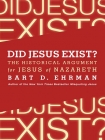Did Jesus Exist? - The Historical Argument for Jesus of Nazareth Bart Ehrman (books to read in your 20s txt) 📖

- Author: Bart Ehrman
Book online «Did Jesus Exist? - The Historical Argument for Jesus of Nazareth Bart Ehrman (books to read in your 20s txt) 📖». Author Bart Ehrman
Schweitzer’s view of the historical Jesus happens to be mine as well, at least in rough outline. I agree with Schweitzer and virtually all scholars in the field since his day that Jesus existed, that he was ineluctably Jewish, that there is historical information about him in the Gospels, and that we can therefore know some things about what he said and did. Moreover, I agree with Schweitzer’s overarching view, that Jesus is best understood as a Jewish prophet who anticipated a cataclysmic break in history in the very near future, when God would destroy the forces of evil to bring in his own kingdom here on earth. I will explain at the end of this book why so many scholars who have devoted their lives to exploring our ancient sources for the historical Jesus have found this understanding so persuasive. For now I want to stress the most foundational point of all: even though some views of Jesus could loosely be labeled myths (in the sense that mythicists use the term: these views are not history but imaginative creation), Jesus himself was not a myth. He really existed.
Before giving evidence for this scholarly consensus, I will set the stage by tracing, very briefly, a history of those who take the alternative view, that there never was a historical Jesus.
A Brief History of Mythicism
THERE IS NO NEED for me to give a comprehensive history of the claim that Jesus never existed. I will simply say a few words about some of the most important representatives of the view up to Schweitzer’s time in the early twentieth century and then comment on some of the more influential contemporary representatives who have revitalized the view in recent years.
The first author to deny the existence of Jesus appears to have been the eighteenth-century Frenchman Constantin François Volney, a member of the Constituent Assembly during the French Revolution.3 In 1791 Volney published an essay (in French) called “Ruins of Empire.” In it he argued that all religions at heart are the same—a view still wildly popular among English-speaking people who are not religion scholars, especially as articulated in the second half of the twentieth century by Joseph Campbell. Christianity too, for Volney, was simply a variant on the one universal religion. This particular variation on the theme was invented by early Christians who created the savior Jesus as a kind of sun-god. They derived Jesus’s most common epithet, “Christ,” from the similar-sounding name of the Indian god Krishna.
Several years later a much more substantial and influential book was published by another Frenchman, Charles-François Dupuis, who was secretary of the revolutionary National Convention. The Origin of All Religions (1795) was an enormous work, 2,017 pages in length. Dupuis’s ultimate objective was to uncover the nature of the “original deity” who lies behind all religions. In one long section of the study Dupuis paid particular attention to the so-called mystery religions of antiquity. These various religions are called mysteries because the exact teachings and rituals were to be kept secret by their devotees. What we do know is that these various secret religions were popular throughout the Roman Empire, in regions both east and west. Dupuis subjected the fragmentary information that survived to his day to careful scrutiny, as he argued that such gods as Osiris, Adonis (or Tammuz), Bacchus, Attis, and Mithra were all manifestations of the solar deity. Dupuis agreed with his compatriot Volney: Jesus too was originally invented as another embodiment of the sun-god.
The first bona fide scholar of the Bible to claim that Jesus never existed was a German theologian named Bruno Bauer, generally regarded among New Testament scholars as both very smart and highly idiosyncratic.4 He had virtually no followers in the scholarly world. Over the course of nearly four decades Bauer produced several books, including Criticism of the Gospel History of John (1840); Criticism of the Gospels (2 vols., 1850–1852); and The Origin of Christianity from Graeco-Roman Civilization (1877). When he started out as a scholar, Bauer concurred with everyone else in the field that there was historically reliable material in the first three Gospels of the New Testament, known as the “Synoptic Gospels” (Matthew, Mark, and Luke; they are called “synoptic” because they are so much alike in the stories they tell that you can place them in parallel columns next to each other so that they can be “seen together,” unlike the Gospel of John, which for the most part tells a different set of stories). As he progressed in his research, however, and subjected the Gospel accounts to a careful, detailed, and hypercritical evaluation, Bauer began to think that Jesus was a literary invention of the Gospel writers. Christianity, he concluded, was an amalgamation of Judaism with the Roman philosophy of Stoicism. This was obviously an extreme and radical view for a professor of theology to take at the state-supported German University of Bonn. It ended up costing him his job.
The mythicist view was taken up some decades later in English-speaking circles by J. M. Robertson, sometimes considered the premier British rationalist of the beginning of the twentieth century. His major book appeared in 1900, titled Christianity and Mythology.5 Robertson argued that there were striking similarities between what the Gospels claim about Jesus and what earlier peoples believed about pagan gods of fertility, who, like Jesus, were said to have died and been raised from the dead. These fertility gods, Robertson and many others believed, were based on the cycles of nature: just as the crops die at the beginning of winter but then reappear in the spring, so too do the gods with which they are identified. They die and rise again. Jesus’s death and resurrection was based, then, on this primitive belief, transposed into Jewish terms. More specifically, while there once may have been a man named Jesus, he was nothing like the Christ worshipped by Christians, who was a mythical figure based on an ancient cult of Joshua, a dying-rising vegetative god who





Comments (0)